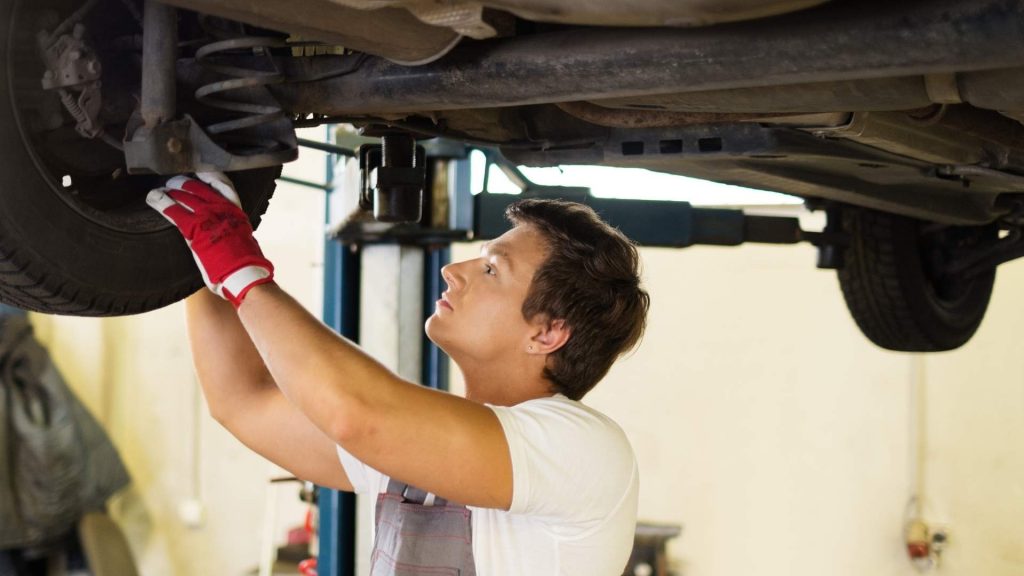Mechanic Near Me | The Importance of Regular Vehicle Maintenance: Tips from a Mechanic
Your car is not only a means of transportation; it’s an investment that needs attention and care. Regular vehicle maintenance can extend its longevity and boost its performance. This blog will discuss why regular vehicle maintenance is so important and how it can save you from future headaches, breakdowns, and costly repairs. We will also uncover common car problems and when you should see a mechanic. And if you’re on the lookout for a mechanic, we’ve got just the right tips for choosing the right one for your car.
Why is regular vehicle maintenance important?
- Safety: A well-maintained vehicle is less likely to break down or experience unexpected failures, reducing the risk of accidents or breakdowns while driving. Regular maintenance tasks like brake checks, tire rotations, and fluid replacements can help identify potential safety hazards before they become major issues, ensuring the driver’s and passengers’ safety.
- Improved Performance: Replacing air filters, spark plugs, and other worn-out parts can help the car run smoothly, providing better acceleration, smoother handling, and fuel economy. Regular oil changes can also help lubricate the engine and prevent it from overheating, increasing lifespan.
- Longevity: By replacing parts before they wear out completely and fixing minor issues before they become major problems, car owners can avoid costly repairs and extend their car’s life. A well-maintained vehicle also has a higher resale value, making it a wise investment in the long run.
- Avoiding Costly Repairs: Replacing parts and fixing major issues can be expensive, and catching and addressing problems early on is better. Regular maintenance can help prevent small issues from turning into major problems, avoiding costly repairs and minimising downtime.
- Maintaining Warranty: Many warranties have specific maintenance requirements, and failing to meet them can void the warranty. By keeping up with maintenance tasks, car owners can ensure their warranty remains valid, saving them money on repairs that the warranty may otherwise cover.
Diagnosing Common Car Problems
- Battery Issues: A dead battery is one of the most common car problems. If your car doesn’t start, you should first check the battery. If the battery is dead, you will hear a clicking sound when you turn the key in the ignition. You can also check the battery’s voltage using a voltmeter to ensure sufficient charge.
- Engine Overheating: If your car’s temperature gauge shows a high reading or you notice steam coming from under the hood, your engine is likely overheating. Various factors, including a coolant leak, a malfunctioning thermostat, or a broken radiator fan, could cause this. In this case, you should turn off your car immediately and let it cool down before diagnosing the issue further.
- Braking Problems: If you notice that your brakes are making a grinding or squeaking noise, it is likely that your brake pads are worn out and need to be replaced. If your brakes feel spongy or you notice a pulsating sensation when you press on the brake pedal, this could indicate an issue with the brake system’s hydraulic components.
- Electrical Issues: If you experience problems with your car’s electrical system, such as a malfunctioning radio, power windows that won’t roll up or down, or lights that won’t turn on, it is likely caused by a blown fuse. You can diagnose this by checking your car’s fuse box and replacing blown fuses.
- Transmission Problems: If you notice that your vehicle is not shifting gears smoothly or there is a delay in shifting, it could indicate a problem with the transmission. A transmission fluid leak, low fluid level, or worn-out clutch can cause transmission issues.
When should you go to a Mechanic?
As a car owner, knowing when to take your vehicle to a mechanic for repairs or maintenance is important. While some issues can be resolved with DIY solutions, professional expertise is sometimes necessary to ensure your vehicle’s safety and reliability.
- Warning Lights: Modern cars are equipped with warning lights that indicate potential issues with the vehicle. If you see a warning light, such as the check engine or oil pressure light, it’s important to take your car to a mechanic as soon as possible. Ignoring warning lights can lead to more significant issues down the road.
- Unusual Noises or Vibrations: If you hear unusual noises or feel unusual vibrations while driving, it could be a sign of a mechanical issue. For example, grinding or squealing sounds when applying the brakes could indicate worn-out brake pads. A vibration in the steering wheel could indicate an issue with the wheels or suspension. A mechanic can diagnose the problem and recommend the necessary repairs.
- Fluid Leaks: If you notice fluid leaks under your car, it’s important to take it to a mechanic immediately. Fluid leaks can be a sign of a serious issue, such as a coolant leak or transmission fluid leak. Ignoring fluid leaks can cause major damage to your vehicle and put your safety at risk.
- Regular Maintenance: Regular maintenance is essential for keeping your car in optimal condition. Some maintenance tasks, such as oil changes and tire rotations, can be done at home. However, other tasks, such as brake inspections and timing belt replacements, require professional expertise. It’s important to follow your vehicle’s maintenance schedule and take it to a mechanic for necessary maintenance tasks.
Benefits of Professional Mechanical Repair
Car owners have different options when it comes to car repairs. While some perform repairs and maintenance, others prefer to bring their cars to professional mechanics.
- Expertise: Professional mechanics have years of experience and specialised car repair knowledge. They have the expertise to diagnose problems accurately and provide the necessary repairs. They also stay updated on the latest technology and trends in the automotive industry, ensuring they can provide the best service possible.
- Quality Parts: Professional mechanics use quality OEM (original equipment manufacturer) parts when repairing cars. These parts are designed specifically for your vehicle and meet the manufacturer’s standards for quality and performance. Quality parts ensure your vehicle performs optimally and is safe to drive.
- Saves Time: Repairing a car takes time, especially if you don’t have the necessary expertise and tools. Professional mechanics have the tools and equipment to perform repairs quickly and efficiently, saving you time and minimising downtime. They can also provide same-day service for many common repairs, allowing you to return to the road as soon as possible.
- Warranty Coverage: If your car is still under warranty, taking it to a professional mechanic ensures that the repairs are covered under warranty. Professional mechanics can provide the necessary documentation and ensure the repairs meet the warranty’s requirements. This can save you money on repairs that would otherwise not be covered by the warranty.
- Safety: Professional mechanics prioritise safety when repairing cars. They have the expertise to identify potential safety hazards and fix them before they turn into major issues. They also ensure that your vehicle complies with safety regulations and is safe to drive.
How to choose the right Mechanic for your Car?
Choosing the right mechanic for your car is an important decision that can impact your vehicle’s safety, performance, and longevity.
- Ask for Recommendations: Ask friends, family, and colleagues for recommendations. People you trust can provide honest feedback about their experiences with mechanics in your area. You can also check online reviews and ratings for mechanics in your area.
- Check for Certifications: Look for a mechanic certified by a reputable organization, such as the Australian Automotive Aftermarket Association (AAAA) or the Institute of Automotive Mechanical Engineers (IAME). These certifications and licenses ensure that the mechanic has the necessary skills and knowledge to work on your vehicle.
- Look for Experience: Consider the experience of the mechanic or repair shop. A mechanic with years of experience has likely seen many car problems and knows how to diagnose and repair them. Additionally, look for a mechanic specialising in your car or the repair you need.
- Check for Warranties and Guarantees: Look for a mechanic who offers warranties or guarantees on their work. A warranty or guarantee provides peace of mind that the repairs are done correctly and that you won’t have to pay for the same repair twice.
- Get an Estimate: Ask for an estimate for the repairs you need. A good mechanic should provide a detailed estimate, including the cost of parts, labour, and other fees. Compare the estimate to other mechanics in the area to ensure you get a fair price.
- Communication: Look for a mechanic who communicates well with you. A good mechanic should explain the repairs needed in simple terms and answer any questions you have. They should also provide updates on the progress of the repairs and notify you of any additional issues that arise during the repair process.

Conclusion
Regular vehicle maintenance plays a crucial role in preventing expensive breakdowns, ensuring your safety, and prolonging the lifespan of your car. Keeping your car tuned up, changing fluids regularly, and running routine checks on critical components such as brakes, batteries, and tires can greatly improve your driving experience. As a responsible car owner, you should also know when to consult a mechanic and how to choose a reliable one.
At DT Performance, they pride themselves on providing top-notch auto repair services to their customers. They offer a comprehensive warranty on all their repairs to give you peace of mind. Contact them today for all your auto repair needs and experience working with a professional and knowledgeable team.
